Cultural Resources

MOTHER’S DAY
CULTURAL RESOURCES
Sunday, May 12, 2013
J. Kameron Carter, Lectionary Team Cultural Resource Commentator
I. Introduction
Mothers are iconic in African American culture because it isn’t easy being a black woman and trying to make it America—trying to get an education (if you can), hold down a job, and raise some chillins, as my grandma used to say. Stereotyped historically as unkempt mammies, sassy jezebels, and lazy welfare queens, denigrated within the symbolic imaginary of U.S. culture as a pathogen within black culture and thus as the cause of its demise, black mothers have had the cultural and representational decks stacked against them for a very long time—notwithstanding the fact that there are two black mothers in the White House. Black women continue to sacrifice, scrimp, and save, as Monica Coleman has recently put it, “to make a way out of no way.” Sadly, this is the struggle that continues to inform black women’s and black mothers’ lives.
Given the struggles of black mothers trying to make it, Stacey M. Floyd-Thomas’s assessment is surely right about the meaning of Mother’s Day and mothering as a divine reality: “Mother’s Day is the day we commemorate the lives of the women who are anointed with the special and the miraculous gift of something called ‘mothering,’ which is best described as the nurturing, caring, and loving spirit of women who have molded and maintained our families and community.” Floyd-Thomas goes on to make a vital point that has been buried within African American Christian traditions from virtually the beginnings of the black folks’ sojourn through the modern Western world when ties to family were severed in the Middle Passage with the dawning of chattel slavery. It was during that painful time in the hulls of slave ships and extending to U.S. southern and Caribbean plantations that family was fundamentally reconfigured. “Lose Your Mother”: This is what literary critic Sadiya Hartman has called this time of the installation of bruised and wounded identities when anything resembling a biologically rooted notion of family tied to the communities left behind in Africa.
Or as Floyd-Thomas puts it in her beautiful 2009 lectionary meditation on Mother’s Day:
This helps explain why Mother’s Day is one of the most celebrated holidays among black folks. In fact, a going joke is that there are CME Christians—Christmas, Mother’s Day, and Easter. Mother’s Day is among the most revered days because to celebrate Mother’s Day in the black church traditions is to revisit the divine gift of motherhood. It is to probe the roots of this gift in God’s own very life. It is to meditate on how the gift of motherhood, a gift displayed in Mary the mother of Jesus of Nazareth and in her “Yes” to God’s angel, the gift of taking “the characterless, shapeless, selfless lump of flesh called a human and molds it into a person, citizen, and legacy,” has its roots in God the caregiving parent who adopts a people.
II. Let a Non-Preacher Preach about Mothers
Although I am not a preacher and although today’s text has been capably exegeted and homiletically handled by Reverend Stacey L. Edwards-Dunn, as a member of the priesthood of all believers, I’d like to preach a bit too, about momma. If I had to tag this text with a title, as my preacher friends would say, it would be either Mother Love or the Gift of Mothering.
Introduction
By way of introducing this sermon, let me say: Hosea 11:1–9 contains the heart of God’s word to the people of Israel in this book of Scripture. In the prior chapters Hosea’s prophecy spoke of the tumult of war and of collateral damage, as it were, or the slaughter of innocents that would ensue because of Israel forsaking God and going after idols or the false gods of that day.
However, with this section of chapter eleven, the entire atmosphere of Hosea’s prophecy changes. We are introduced to the faithfulness, or the chesed,of God.
How did this faithful call of God’s mother love show itself in the world? It was a call for Israel to come out of bondage. It was a call that would care, guide, and shape a people.
And finally, through God’s prophets, it was an ongoing call to not follow the false gods, the idols, of the day. What is important is that in this scenario of caretaking and guidance, God is the divine parent who teaches Israel how to walk, who gives Israel guidance by gently leading Israel by the arm, who guides them with “bands of love,” who lifts them up as “infants to [my] cheeks,” and who finally despite the rebellion of the child at times nevertheless “[bends] down” to “[feed] them.”
Point One
This is the message of Hosea 11:1–4. It is a message that is unmistakably parental even as it at the same time revises our understanding of what’s involved in parenting. And indeed, while commentators often link this parental imagery to fathering, there is nothing preventing such imagery from being understood as a divine performance of mothering.
(In Hebrew, there is not distinction between the male and female grammatical forms.) In fact, in chapter 2, God is presented as the male husband to Israel as wife, while here in chapter 11, arguably, Hosea shifts to represent God not as male but as a female mother.
The rest of the sermonic text further displays God’s motherhood and God’s mother love in the face of the rebellion of God’s people (vv. 5-7), a love that’s similar to the bottomless love of a mother refusing to abandon that rebellious child. At the heart of this display is the revelation of God’s bottomless love and faithfulness to not utterly banish the rebellious child from God’s household, but to be amid God’s suffering children and restore them.
Today is the day we come together to appreciate those whom society mostly under-appreciates: black mothers. And it is also a day that the lectionary text speaks powerfully to us as God represents Godself in motherly terms. In this passage God is the faithful mother. Indeed, for all the talk of God as Father throughout the Bible—and far be it from me to hate on fathers—in this passage God is mother.
Point Two
What does it mean to proclaim God as mother in a society that speaks, as one politician recently has, of “binders full of women”? What does it mean that God represents Godself as a women and indeed as a mother in a society, again as our recent presidential election demonstrated, in which men seek to dictate the terms and meaning of womanhood and motherhood? What does it mean that it is to woman that God turns to narrate God’s eternal care and faithfulness to creation, and that in this we hear and find the gospel, the Good News?
I want to suggest that it is in a text such as the one before us now that we begin to hear God’s answer to these questions.
God is one who, like so many black mothers out there, cares for God’s children. God is like so many black mothers out there, who in the struggle to raise her children in the face of untold challenges and often as a single parent never stops loving her children and at no time abandons them. Let me say it again: God is like so many black mothers out there.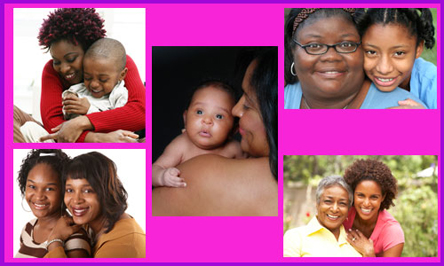
This all begs interconnected questions for us on this Mother’s Day: Who and What is Love? Or, what makes mothers do what they do?
There is a Word from the Lord in our text that begins to answer these questions. Speaking through the prophet Hosea and to Ephraim (God’s affectionate, intimate, and parental name for Israel), God says to Israel in this people’s moment of deep difficulty that “it was I, the Lord, it was I Yahweh who taught [you] how to walk; I took [you] up in my arms . . . I was to [you] like those who lift infants to their cheeks. I bent down to [you] and fed [you].” The text goes on to say that even when you, O Israel, resisted God, your parent, your mother, God (like many a black mother) says, “How can I give you up . . . How can I hand you over to the dangerous forces out there surrounding you, O Israel?”
There is a lesson in this for us today as we honor and celebrate black motherhood: if we would get a glimpse of God’s care, of God’s fidelity and faithfulness, of God’s chesed, we need look no further than many of the black women and mothers in our midst today.
Point Three
Mothers remind us where we’ve been. They call us to leave the illusions or the false gods that demand our obedience only to destroy us. And finally, mothers give us a name worth living into, a name beyond the name that our world would place on us to limit us. In other words, mothers speak a creative word of deliverance over us and love us in ways beyond our comprehension. They are an unspoken word for us, providing us a “mother’s wit” that helps us navigate our lives in ways that we often don’t even recognize. We find these elements in Hosea’s oracle, which is presented as a memory like a parent flipping through the pages of a photo album, recalling the ways in which they cared for us from earliest times. God as mother both loves the child, calls the child, and providentially cares for the child. That is, God calls Israel out of slavery in Egypt, God names Israel, calling Israel by name, and God protects in ways unseen.
- Not unlike a parent, God allows us to venture out on our own as we refuse God’s parental wisdom.
- And in being a good parent, God, like mothers sometimes have, allows us to suffer the consequences of our bad choices.
God’s parental, even motherly, faithfulness and bottomless love trumps any rebellion God’s children could ever display. Even when we may suffer the consequences of turning from God and following after the false gods of our day, God is the kind of parent who will not allow the consequences of that rebellion to be ultimate and final. In fact, God is not emotionless. As parent, how could God be without emotion? In seeing the broken condition of God’s child, God’s heart is changed. God repents or changes God’s mind. God is overtaken by care, with compassion, with feeling, and by emotion. God, the motherly parent cries, as it were, within Godself for God’s child. And though God could have, might have, allowed God’s wayward child to be expelled from the house, God determines within Godself not to allow destruction to take place. Rather, God stands amid God’s people not in wrath but in God-restoring, parent-affirming love to the “prodigal son.”
My preacher friends would say at this point, it’s time to celebrate.
With the assurance of God’s enduring and faithful mother-love, we can say, Thank you, God, for your heavenly love. Thank you God for divine love. Thank you, God, for your caring love. Thank you, God, for your providing love. Thank you, God, for mother love.
III. Ideas for Mother’s Day
- Start a scholarship in your mother’s name. Anyone can start a scholarship fund in the name of a loved one. The amount of the fund can be whatever you decide. You can give to the fund quarterly or yearly. You can open a trust and let money accrue and then begin the scholarship fund. You can even host fundraisers that contribute to the fund. What better way to honor your mother and help others in the process. If your mother was or is in a particular profession, you may want to support students in or entering that profession.
- Read to your mother. You would be amazed at how happy your mother would be to hear your voice. You can prepare a letter, poem, or even an entire story to read to your mother. You can even be creative and record a message and place it inside of a creating card or a CD, or you can read to your mother via skype.
- Visit the grave of your mother. This one may be difficult but could prove therapeutic. Even if this is a trip that will take a great deal of planning, just do it.
- Tell your children or anyone you love about your mother. We should honor those we love by lauding them often instead of taking them for granted. If your mother is deceased, it would be great to let others know how special she was, especially children and grandchildren. Also, be careful to tell others about the ways that your mother has helped you become who you are and the lessons she taught you.
- Write a book about your mother. This may seem daunting but it need not be. Perhaps siblings, relatives, your children, and/or friends can assist you. You can self-publish the book using a local printer or use one of the online services. (Be careful, some of the online publishing services are pricey.) You are not doing this to make money, so there’s no need to spend a lot of money on the project. Keep it simple but meaningful to your mother, or just to you if your mother is deceased. You may want to write about what your mother taught you about being a Christian, or her sense of humor, or her favorite recipes.
IV. Music for This Lectionary Moment
Instead of songs like “Faith of Our Mothers,” which is a fine song, and all of those like it, this Mother’s Day I’d like to suggest songs that speak to many young mothers now. The first is “Superwoman,” sung by the incomparable Alicia Keys. Superman is a mythical character. Superwoman is a mythical black mother and woman. Too many women, especially mothers, tell themselves they are superwomen as they fight to make a way out of no way, and convince themselves that they can do it. No, mothers aren’t superwomen, but they sure do super things. The second song is about an abused mother whose children were victims of and witnesses to the abuse. In this instance, this mother survives and moves from being a victim to being victorious. Oh how we wish this could be the testimony of every abused mother. The final song, which is likely little known in African American circles, contains sentiments and lyrics that are so familiar to all of us who in our ignorance saw our mothers as our enemy and over time, we came to ourselves and realized that they were special gifts God had placed in our lives. Happy Mother’s Day.
Superwoman
by Alicia Keys
Everywhere I’m turning
Nothing seems complete
I stand up and I’m searching
For the better part of me
I hang my head from sorrow
State of humanity
I wear it on my shoulders
Gotta find the strength in me
[Chorus]
I am a Superwoman
Yes I am
Yes she is
Even when I’m a mess
I still put on a vest
With an S on my chest
Oh yes
I’m a Superwoman
For all the mothers fighting
For better days to come
And all my women, all my women sitting here trying
To come home before the sun
And all my sisters
Coming together
Say yes I will
Yes I can
[Chorus]
When I’m breaking down
And I can’t be found
And I start to get weak
Cause no one knows
Me underneath these clothes
But I can fly
We can fly, ooh
[Chorus]
Oh Mother
by Kara Dioguardi, Christina Aguilera, Bruno Coulais, and Leonardo Capistran
Whoa, oh, yeah
She was so young with such innocent eyes
She always dreamt of a fairytale life
And all the things your money can’t buy
She thought daddy was a wonderful guy
Then, suddenly, things seemed to change
It was the moment she took on his name
He took his anger out on her face
She kept all of her pain locked away
Oh mother, we’re stronger
From all of the tears you have shed
Oh mother, don’t look back
‘Cause he’ll never hurt us again
So, mother, I thank you
For all you’ve done and still do
You got me, I got you
Together we always pull through
We always pull through
We always pull through
Oh mother, oh mother, oh mother
It was the day that he turned on his kids
That she knew she just had to leave him
So many voices inside of her head
Saying over and over and over
‘You deserve much more than this.’
She was so sick of believing the lies and trying to hide
Covering the cuts and bruises (cuts and bruises)
So tired of defending her life; she could have died
Fighting for the lives of her children
Oh mother, we’re stronger
From all of the tears you have shed (all of the tears you have shed)
Oh mother, don’t look back
‘Cause he’ll never hurt us again (He’ll never hurt us again)
So, mother, I thank you (thank you)
For all that you’ve done and still do (still do)
You got me, I got you
(Yeah, you got me, and I got you)
Together we always pull through
We always pull through
We always pull through
Oh mother, oh mother, oh mother
All of your life you have spent
Burying hurt and regret
But, mama, he’ll never touch us again
For every time he tried to break you down
Just remember who’s still around
It’s over, and we’re stronger
And we’ll never have to go back again
Oh mother, we’re stronger
From all of the tears you have shed
Oh mother, don’t look back (Oh mother, don’t look back again)
‘Cause he’ll never hurt us again
(‘Cause he’ll never hurt us again)
So, mother, I thank you (And I thank you for everything you’ve done)
For all that you’ve done and still do (Together we always move on)
You got me, I got you (You got me, I got you)
Together we always pull through (always pull through)
We always pull through
We always pull through
I love you, mom.
Mama
by Delyno Brown, Dean Pond, and Eno Stafford
She used to be my only enemy and never let me be free
Catching me in places that I knew I shouldn’t be
Every other day I crossed the line
I didn’t mean to be so bad
I never thought you would
Become the friend I never had
Back then I didn’t know why
why you were misunderstood (Mama)
So now I see through your eyes
All that you did was love
Mama I love you, Mama I care
Mama I love you, Mama my friend
You’re my friend
I didn’t want to hear it then but
I’m not ashamed to say it now
Every little thing you said and did was right for me
I had a lot of time to think about
about the way I used to be [harmony]
Never had a sense of my responsibility
Back then I didn’t know why
why you were misunderstood
So now I see through your eyes
All that you did was love
Mama I love you, Mama I care
Mama I love you, Mama my friend
You’re my friend, you’re my friend
But now I’m sure I know why (I know why)
Why you were misunderstood
So now I see through your eyes
(See through your eyes)
All I can give you is love
(All I can give you is love)
Mama I love you, Mama I care
Mama I love you, Mama my friend
Mama I love you, Mama I care
Mama I love you, Mama my friend
Oh (you’re my friend)
Ma Mama, oh (you’re my friend)
Oh Ma Mama, oh
Oh Ma Mama, oh
Mama I love you, Mama I care
Mama I love you, Mama my friend
Mama I love you, Mama I care
Mama I love you, Mama my friend
Me loving you, you loving me
A love that’s true and guaranteed
Me loving you, me loving you
you loving me, you loving me
A love that’s true, a love that’s true
And guaranteed, so true
Me loving you, you loving me
A love that’s true and guaranteed
Me loving you, me loving you
You loving me, you loving me
A love that’s true, a love that’s true
And guaranteed, so true
V. Books for Mother’s Day
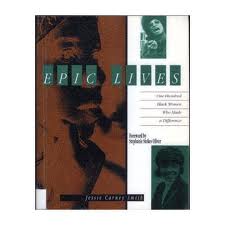 |
Carney Smith, Jessie ed. Epic Lives: 100 Black Women Who Made a Difference. Canton, MI: Visible Ink Press, 1992. |
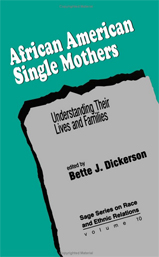 |
Dickerson, Bette J., ed. African American Single Mothers: Understanding Their Lives and Families (SAGE Series on Race and Ethnic Relations). Thousand Oaks, CA: Sage Publications, 1995. |
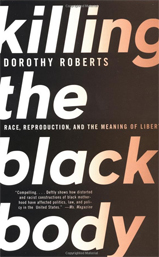 |
Roberts, Dorothy. Killing the Black Body: Race, Reproduction, and the Meaning of Liberty. New York, NY: Vintage Press, 1998. |
 |
Williams, Kelly. Single Mamahood: Advice and Wisdom for the African-American Single Mother. New York, NY: Citadel Press, 2000. |
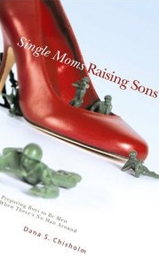 |
Chisholm, Dana S. Single Moms Raising Sons: Preparing Boys to Be Men When There’s No Man Around. Kansas City, MO: Beacon Hill Press, 2006. |
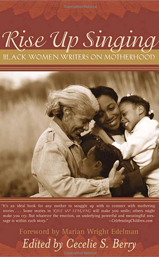 |
Berry, Cecelie S., ed. Rise Up Singing: Black Women Writers on Motherhood. New York, NY: Broadway Press, 2005. |
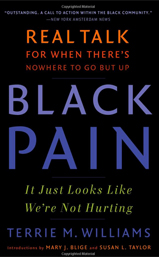 |
Williams, Terrie M. Black Pain: It Just Looks Like We’re Not Hurting. New York, NY: Scribner, 2009. |
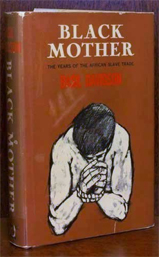 |
Davidson, Basil. Black Mother: The Years of the African Slave Trade. New York, NY: Little, Brown and Company, 1961. |



